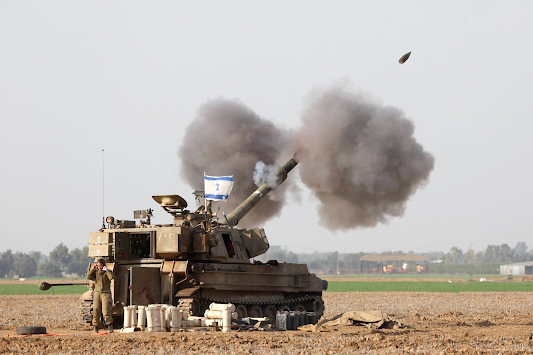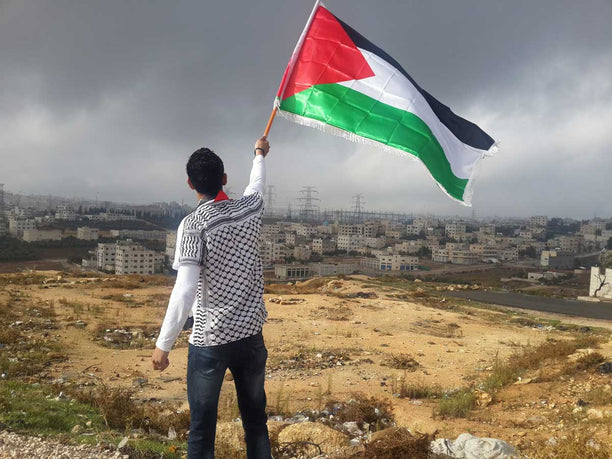After a brief ceasefire, Israel's rolling attack on Gaza continues. Estimates of deaths in the Strip now are touching 20,000. Israel has killed more civilians in Gaza in ten weeks than Russia has in 20 months in Ukraine. Doubtless, Israel is striking some Hamas 'targets' or 'operatives' or even 'command and control centres'. But the 'collateral damage', the cost in civilian lives, is unimaginable. On a recent American TV programme, an Israeli official declared that Israel was killing only 2 civilians for every Hamas fighter killed, and proclaimed that the IDF was displaying the 'gold standard of urban warfare'.
*****
In a powerful article in the New Yorker, trying to pierce the formidable carapace of dead language and hypocrisy which encrusts so much public discussion of what is happening, the brilliant Russian-American (and Jewish) writer, Masha Gessen, has compared what is perpetrated in Gaza to the 'liquidation' of the Warsaw Ghetto in 1943. Their essay caused ructions in Germany, where Gessen has just been awarded the Hannah Arendt Award. Many now ask if Arendt's writings about totalitarianism, about stateless people, about the Eichmann trial, could be published in the fervid atmosphere of purported anti-anti-Semitism in Germany. It's hard not to see in this frantic mood the murky id of Germany's past guilt and failures. And it reminds one that so often philo-Semitism and anti-Semitism are related.
*****
In the years of the Holocaust and persecution of the Jews of Europe, when the direct crimes were committed by the Nazis and their various proxies in the countries they conquered, crimes of a more oblique but enormously shameful kind were committed there and elsewhere - in the refusal of entry to Jewish refugees by many countries, including Ireland and the United States; in the willing acceptance of the concept of 'Judeo-Bolshevism' by the right wing all over the West; in the capacity of people in authority as well as ordinary citizens in territories conquered by the Wermacht to stand by while crimes of prejudice, murder and genocide were conducted in plain sight; in the willingness of the putatively socialist Soviet Union to negotiate a 'non-aggression pact' with Nazi Germany which facilitated the most shocking aggression against the sovereign state of Poland and the division of that country and in fact all of eastern Europe into German and Russian fiefdoms.
So now we have a proximate situation with Israel's monumental slaughter in Gaza. We have Western leaders - Biden, Sunak, Macron, von der Leyen, Scholz - giving Israel the clearest green light at the start of this process, and only very very slowly, at the cost of thousands of Palestinian lives, coming towards a point where supporting a ceasefire might seem like appropriate action. Even last week, EU leaders failed to agree on a call to ceasefire. We have the United States arming Israel with thousands of tons of ordnance, smart bombs, dumb bombs, voting billions of dollars in ongoing military aid.
*****
Since 1948, Israel has received $158 billion in military aid from America. Under the apparently pacific Obama administration, a deal was negotiated in 2016 that upped Israel's annual military aid from America to over $3.8 billion. Hours after the Hamas attacks on October 7, the United States began a massive deployment of military assets to the eastern Mediterranean, including two aircraft carrier battle groups - each one larger and more powerful than the navies of most countries in the world. American military liaison with Israel was greatly increased. The United States has deployed over 100 combat aircraft to the Middle East to intervene in protection of Israel. President Biden announced through October that his administration would put together an emergency aid package for Israel. On October 20, the President reported that this package which he would ask Congress to vote through would come to $14 billion, as part of a $105 billion overall deal.
The Wall Street Journal - no enemy of Israel - has reported that the USA has, since the current hostilities began, sent to Israel over 15,000 bombs to be delivered by aircraft or drones. Some of these are 'bunker buster' bombs, which drill down into the target surface before exploding. Some of them are laser-guided 'precision' munitions. Many are, however, unguided 'iron' bombs or 'dumb' bombs, whose deployment as well as effect is completely indiscriminate. The United States has re-supplied Israel with 57,000 155mm howitzer shells, for use by the IDF's American-supplied M109 self-propelled guns. The blast radius or zone of lethality for a 155mm shell is about 50 metres i.e. anything within a football-pitch-sized area of the point of impact of such a shell may be damaged or destroyed. Here is a graphic which provides information on such shellfire. Note the figures on shrapnel projection from each shell-burst:
And here is an Israeli M109 in action:
The United States has also elected to send Israel large re-supplies of tank gun ammunition, to keep Israel's Merkava main battle tanks effective. On December 9, the Biden administration announced a manoeuvre to bypass the need for Congressional approval for the transfer of 14,000 shells to Israel (worth $106.4 million). This is part of a larger package which involved up to 45,000 tank shells. On the same day as the delivery was announced, State Department officials said that Washington was continuing to make it clear to Israel that it must comply with humanitarian law and avoid civilian casualties. Secretary of State Blinken provided detailed justification for the shells to Congress, arguing that their supply to Israel is in America's national security interest.
The shells will come from US Army inventories and consist of M830A1 MPAT 120mm tank cartridges and related components. The M830A1 MPAT is a type of tank ammunition used by the United States Army and Marine Corps. It is designed to provide a dual-purpose capability, with both anti-armour and anti-personnel effects. In the 120mm M830A1 MPAT (Multi-Purpose Anti-Tank) tank cartridges, the penetrator is made of depleted uranium, which provides increased density and armour-piercing capabilities. It is worth noting that depleted uranium (DU) ammunition, including the M830A1, has been subject to international debate and scrutiny due to concerns about the potential health and environmental risks associated with its use.
*****
Many analysts estimate that the kill rate due to Israeli munitions in Gaza is the highest any war or combat zone has witnessed since the Second World War.
*****
The United States is not Israel's only armourer - the UK supplies Israel with military support, and Germany has reiterated that the defence of the State of Israel is part of its 'staatsraison' or 'reason of state'. On the contortions of the latter, see Sabine Broeck's brilliant letter in the Massachussetts Review:
Staatsraison: Dispatch From Germany | Mass Review
*****
It is worth noting that Israel's overwhelming reaction currently in Gaza is not a new doctrine or approach. Many link it to the 'Dahiya doctrine', first articulated by IDF General Gadi Eizenkot during Israel's war with Hezbollah in Lebanon, in 2006. It involves the deliberate use of 'disproportionate' force against a guerrilla enemy. Here is Eizenkot in 2010:
The method of action in Lebanon [in 2006] was that, in the first stage targets were attacked which formed an immediate threat, and in the second stage the population was evacuated for its protection, and only after the evacuation of the population were Hezbollah targets attacked more broadly. I am convinced that this pattern was a moral pattern, that it was correct to use, and if another campaign is required it will be correct to act in the same way. It is Hezbollah which transforms the hundreds of villages and the Shiite areas of Lebanon into combat spaces. I hope this understanding will cause the organization to consider carefully before it decides to use any more terror, kidnapping, or shootings.
At least three things stand out in Eizenkot's statement: 1) the idea of moving the population out of the combat zone - an apparently 'humanitarian' move, which is then undercut two sentences later; 2) the rhetorical formulation whereby it turns out to be Hezbollah which 'transforms the hundreds of villages and the Shiite areas of Lebanon into combat spaces', blaming the victims ('it is the children of Gaza who have brought this upon themselves' - MK Meirav Ben-Ari of the 'liberal' and 'centrist' Yesh Atid); and 3) the conviction that the 'pattern was a moral pattern'. Thus, a theorist and senior officer of the most moral army in the world. But it must also be noted that Israel has long had a policy or tendency of responding with overwhelming force to Palestinian raids into Israel, going all the way back to the Qibya raid on the West Bank in 1953, led by the young Ariel Sharon, which was, according to Israel, occasioned by the murder of an Israeli woman and her two children, and which resulted in the deaths of 69 Palestinian civilians.
The Israeli approach is typical of colonial regimes - British, French, South African - which frequently conducted 'punitive raids' to cow the colonised in the nineteenth and on into the twentieth century. One notes the 'razzias' favoured by the French in their brutal pacification of Algeria, under Marechal Bugeaud in the 1840s - such as the extraordinary and savage massacre of the entire Ouled Rhia tribe, at Dahra - 900 men, women and children sealed up and suffocated in a cave. Or, even worse, the Sétif massacres of Algerian civilians by French forces in 1945. Algerians celebrating the surrender of Nazi Germany on May 8, 1945 were severely policed by the local gendarmerie, and flags and banners calling for national independence were confiscated. Reports from Sétif incited violence in the countryside, and 102 pieds-noirs settlers were murdered by Algerians. Over the following six weeks, in a series of ratissages, the French army and colonial militias and vigilantes slaughtered at least 6000 Algerians around Sétif and Guelma, possibly as many as 30,000, in reprisal.
*****
The United States has voted against at least two resolutions of the United Nations General Assembly calling for a ceasefire. The United States has also used its veto on the UN Security Council to block two resolutions - one in late October and one on December 8 - calling for unconditional ceasefire.
*****
Accordingly, one can say that the United States is grossly complicit in the Israeli massacre of 20,000 Palestinians which has taken place since October 7. The United States - as armourer, as military protector and ally, as diplomatic protector and ally, as ideological ally - is guilty of war crimes and gross crimes against humanity, including those of ethnic cleansing and genocide, in the Gaza Strip.
*****
Here are two impressive articles to read on this subject - at a time when the flow of information and commentary is so overwhelming, these writers help cut to more fundamental understanding.
Bashir Abu-Manneh is a senior scholar at the University of Kent, an old friend and admired colleague of mine and a fearless speaker on the condition of Palestine. Here he is interviewed by Daniel Finn, himself a prominent pro-Palestine commentator in both Britain and Ireland, in Jacobin:
Israel’s War on Gaza Is a Campaign of State Terrorism to Crush the Palestinian People
And here is Mearsheimer in conversation mostly about the same article, with Freddy Sayers of UnHerd:
Conor











